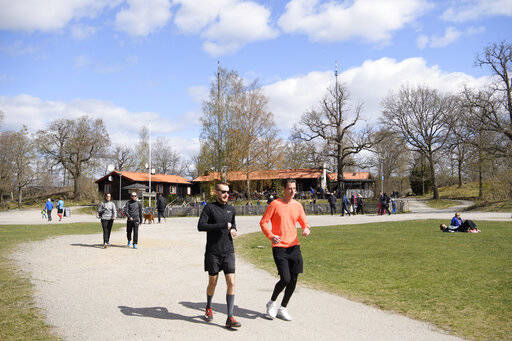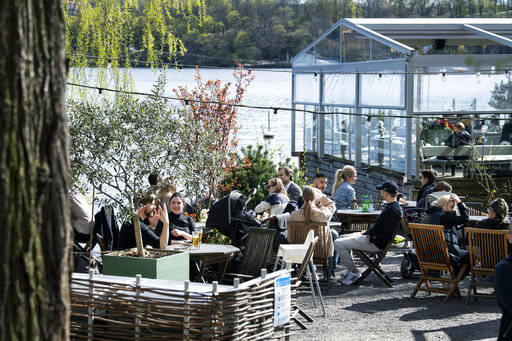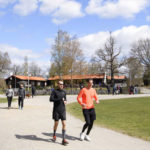Critics of coronavirus-related shutdowns have pointed to Sweden’s path toward “herd immunity” as justification for advocating an end to stay-at-home orders, even as some infectious disease experts warn the Swedes’ methods could be deadly.
Building herd immunity has gained popularity in some circles as an alternative to widespread shutdowns and shelter-in-place orders. Although Swedish officials have said that was not their goal, the country’s lax restrictions have them conceding they are building toward herd immunity.
According to the concept, more people exposed to the virus will equal fewer overall cases, said Johns Hopkins epidemiology professor Gypsyamber D’Souza.
The idea is that once a majority of a population — anywhere from 60% to 80% — is protected from infection because of having been exposed or vaccinated, the disease will stop spreading because most people will not be susceptible.
Herd immunity is usually achieved through vaccines. But because there is no covid-19 vaccine, and a vaccine is likely at least a year away, according to the Mayo Clinic, that’s not possible with the coronavirus in the short term.
The Swedish strategy has relied on mostly voluntary social distancing and restrictions on business rather than blanket shutdowns. Museums and sporting events have been shut down and gatherings of more than 50 people are banned. But restaurants have remained open, though with seats farther apart; high schools have closed but schools for lower grades are open.
The Swedish ambassador to the United States said their guidelines could mean that herd immunity in the capital, Stockholm, may be reached “in the next few weeks,” according to NPR.
Officially, the Swedish government says it is not pursuing herd immunity.
“We are trying … to slow down the spread as much as possible,” Anders Tegnell, country’s state epidemiologist, told The New York Times. “It’s just that we use slightly different tools than many other countries.”
Countries that have enacted shutdowns, including the United States, continue to struggle with containing the coronavirus or are only slowly starting to reopen sectors of society. Pennsylvania Gov. Tom Wolf, for instance, on Friday is expected to announce regions where restrictions will be lifted.
For the United States, at least, adopting an approach such as Sweden’s would prove more deadly than the coronavirus already has been, D’Souza said.
“To get to that high proportion of Americans would involve a much higher number of deaths than we’ve seen so far,” D’Souza said.
She pointed to New York City as an example. New studies suggest that between 14% and 20% of residents there have been exposed to the virus. New York City has more deaths as a result of covid-19 — more than 18,000 — than any city in the country. Yet D’Souza said the number of cases — and deaths — would be three or four times higher in order to achieve herd immunity without a vaccination.
Dr. Mark Roberts, chair of health policy management at Pitt’s Graduate School of Public Health, said covid-19 might need a lesser percentage of the population to be immune for herd immunity to be achieved. He pegged it at about 50% to 60%.
But that still would mean infections nationwide would need to number in the millions, he said. Deaths would be much higher as well — higher than the 61,000 who have already died.
D’Souza said that when it comes to many viral infections, a person develops antibodies after he or she is exposed. Antibodies offer some protection — either by not getting infected at all or by experiencing less severe symptoms. Other times, antibodies offer no protection.
Because covid-19 is a new type of coronavirus, she said, it’s uncertain whether antibodies offer protection.
“It’s hopeful that perhaps that will be the case,” she said, “but we don’t know.”
D’Souza pointed to a study out of the Netherlands that suggests about 3% of the population there has antibodies against the coronavirus. If there were a similar rate in the United States, there would need to be an exponentially more coronavirus cases — and thus there would be more deaths — to reach even 50% immunity.
Sweden, as of Thursday morning, had 21,092 confirmed covid-19 cases and 2,586 deaths, according to data from Johns Hopkins. Sweden’s 10.2 million population is a fraction of the 328.2 million in the U.S. The population of Pennsylvania is about 12 million.
Neighboring Finland, which has about half the population of Sweden, had 4,995 cases as of Thursday and 211 deaths. Norway, which also has just over 5 million residents, has 7,710 cases and 207 deaths.
Finland and Norway both shut down myriad places, including libraries, theaters, recreation centers, schools, sports facilities — almost any public gathering place. Both countries also placed limits on gatherings of more than a few people.
There is no scientific proof that those who recover from covid-19 are immune or protected from a second infection, according to the World Health Organization, raising questions of whether herd immunity is even possible with the virus.
“The balancing act is that herd immunity requires a large portion of the population to be immune,” Roberts said. “That means a large portion have to get it.”
He said if the virus’s mortality rate is 1% — current estimates range from 0.2% to 0.5% to as high as 6% — and 50% immunity is needed, that’s still about six million Pennsylvanians who will have to contract the virus, and that would equate to about 60,000 deaths in just Pennsylvania. As of Wednesday, 2,195 people across the state had died from the virus.
D’Souza said she doubts the claims that Sweden will reach true herd immunity in the next several weeks. Roberts said time will tell.
“Sweden is doing pretty good surveillance. They have unbelievably good data systems,” he said. “We’ll know. And we’ll know what the cost of it is.”











